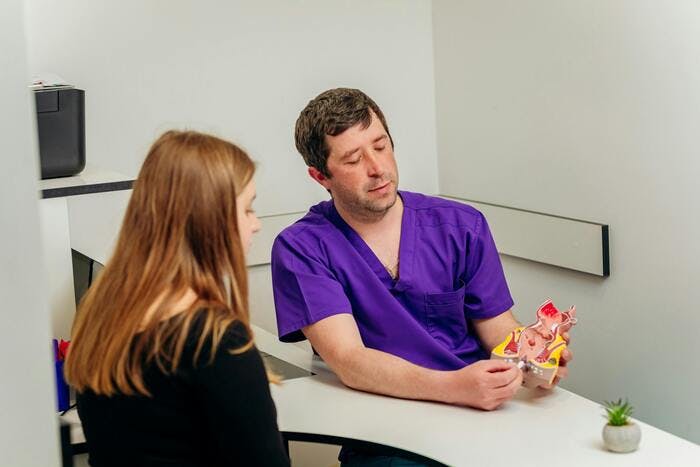Who Should You See for Hemorrhoid Treatment?

When it comes to your hemorrhoids, you may be confused about who to see and how to treat your issue. That’s why we’re here. Learn how to discuss your hemorrhoids with your doctor, and explore various hemorrhoid treatments so you can make the best decision for your health.
What Kind of Doctor Treats Hemorrhoids?
When it comes to hemorrhoid treatment, visiting your general practitioner is usually the first step in treating your discomfort.1 If you’ve had hemorrhoids for a while, visit your healthcare provider if you notice any new symptoms, or if your symptoms get worse. In addition, it’s important to consult your doctor if you notice any blood for the first time, or if there’s more than usual.1 From there, your doctor can recommend a specialist, usually a gastroenterologist (a specialist in digestive diseases) or a colorectal specialist (a colon and rectal surgeon).2
What’s the difference between a gastroenterologist and a colorectal specialist?
While both deal with the gastrointestinal system, there are a few differences between a gastroenterologist and a colorectal specialist. A colorectal specialist, formerly known as a proctologist, mainly focuses on diseases of the colon, rectum and anus, and can perform corrective surgeries in those areas. A gastroenterologist focuses on the entire digestive system and isn’t trained to operate on their patients.3
Diagnosing Hemorrhoids
If you have external hemorrhoids, your primary care doctor can usually see them. If you have internal hemorrhoids, your doctor might need to look at your anal canal and rectum. If your provider can’t find your internal hemorrhoids during a physical exam, they may need to conduct a visual inspection of the lower part of your colon and rectum using a scope, or a flexible tube connected to a tiny camera lens.2 If your doctor needs to look at your entire colon, they’ll conduct a colonoscopy—a procedure that involves emptying your bowels so your doctor can look at your entire large intestine, or colon. You may need one if you have risk factors for colorectal cancer, are middle aged and haven’t had a colonoscopy recently, or show symptoms of additional digestive diseases.2
Treating Hemorrhoids with Medication
If your hemorrhoids are uncomfortable, your physician might recommend topical medications, like creams, ointments, suppositories, wipes, etc. that contain ingredients like soothing lidocaine and witch hazel.2
Treating your Hemorrhoids at Home
For relief from your hemorrhoid discomfort at home, try Preparation H’s line of medicated hemorrhoid products to relieve symptoms like burning and itching. Depending on your needs, choose between our original formula or soothing relief products. Find the product that’s right for you with our relief finder quiz.
Treat your flare up with topical treatments from Preparation H that provide temporary relief from hemorrhoid pain.
Minimally Invasive Hemorrhoid Procedures
If your hemorrhoids are severe or bleed an abnormal amount, your doctor might recommend fixing them with a minimally invasive procedure—a procedure or surgery that requires small incisions, a short recovery time, and little to no numbing agents. These can include the following:
Rubber Band Litigation
A rubber band litigation involves your doctor or a gastroenterologist placing one or two rubber bands around the base of an internal hemorrhoid to cut off its circulation. Without any blood flow, the hemorrhoid will shrink and fall off within a few days to a week.1,2
Sclerotherapy
Coagulation
Coagulation, also called electrical coagulation or infrared photo coagulation, uses a laser or light to burn off hemorrhoid tissue, causing the hemorrhoid to harden and shrivel. Coagulation techniques typically don’t cause any major pain or side effects.1,2
Treating Hemorrhoids with Surgical Procedures
Only a small percentage or people with hemorrhoids need surgery to remove them. However, if you have severe hemorrhoids, your doctor may send you to a general surgeon or colorectal specialist to have them surgically removed with one of the following methods.1,2
Hemorrhoidectomy/Hemorrhoid Removal
A hemorrhoidectomy is a procedure that permanently removes hemorrhoid tissue and subsequently closes the remaining wound. These surgeries involve the use of local anesthesia combined with a sedative to help you feel less anxious. Your specialist may recommend soothing baths after to help relieve any discomfort while you recover.2
Hemorrhoidopexy/Hemorrhoid Stapling
A hemorrhoidopexy uses a stapling device to block blood flow to internal hemorrhoids. While a hemorrhoidopexy requires less recovery time than a complete hemorrhoid removal, it’s also associated with a higher risk of hemorrhoids returning.2
No matter what’s causing your hemorrhoids, there are a range of home remedies, OTC medications and medical procedures that can help you find relief from pain and discomfort. Keep Preparation H Medicated Wipes on hand to soothe and cleanse the affected area to protect against further irritation and discomfort while you and your healthcare provider decide on a course of action.
Source Citations:
- Hemorrhoids. Johns Hopkins Medicine. https://www.hopkinsmedicine.org/health/conditions-and-diseases/hemorrhoids. Accessed 9/26/23.
- Hemorrhoids - Diagnosis and treatment. Mayo Clinic. https://www.mayoclinic.org/diseases-conditions/hemorrhoids/diagnosis-treatment/drc-20360280. Accessed 9/26/23.
- Proctology. MaineHealth. https://www.mainehealth.org/Services/Gastroenterology/Proctology/. Accessed 9/26/23.
